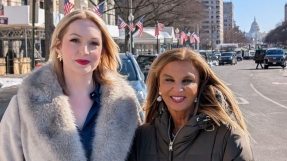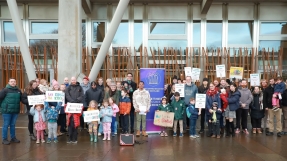
The writer of the Letter to the Hebrews reminds Christians that they are surrounded by a great "cloud of witnesses." (NRSV) That "cloud" has continued to grow in size since then. In this monthly column we will be thinking about some of the people and events, over the past 2000 years, that have helped make up this "cloud." People and events that have helped build the community of the Christian church as it exists today.
The Christian community is rooted in the idea of being "salt" and "light" in the world (Matthew 5:13–16). From this comes the idea that Christians are not only called to declare/reveal to others the nature of God and the way of salvation, but also to counter that which makes the world rotten and which corrupts communities. In other words, to be a salt-like presence in the world.
This second point raises several questions. Where does countering wrong shade into confronting it? How active and energetic should such confrontation be? Where should we look, regarding the human sources of what corrupts society?
It seems fair to say that, historically, the Christian community and its leadership have been most comfortable in tackling this issue when it comes to challenging personal/individual expressions of sin and corruption; and least comfortable when it comes to confronting it in powerful institutions, systems and rulers.
Of course, one can think of those who have had the courage to act as Nathan did to David (2 Samuel 12: 1–10), or have confronted the sins of society (both individual and institutional) as Amos did (Amos 2:6–8).
However, more often the church has shown a reluctance to challenge the powerful, and even more reluctance to challenge the entrenched systems that enslave, oppress, corrupt, and marginalise other human beings.
When the church and its leaders do challenge the powerful and the systemic, they can find that the push-back is severe. Indeed, they can be attacked for having the temerity to venture beyond confronting personal sin, and into the realm of institutional sin.
As the Brazilian Catholic archbishop Hélder Pessoa Câmara (1909–99) reportedly put it: "When I give food to the poor, they call me a saint. When I ask why they are poor, they call me a communist."
The life and violent death of another archbishop vividly illustrates what can happen when Christian leaders confront sin at the highest levels.
Murder at the altar
On the sunny morning of 24 March 1980, Catholic Monsignor Oscar Romero y Galdamez, archbishop of San Salvador, was presiding at a memorial Mass in the Carmelite chapel of the Hospital de la Divina Providencia. As he stood at the altar a single shot from an assault rifle struck him in the heart. Scattered discs of host were stained red by the spreading pool of his blood.
At the time of his assassination, El Salvador was being torn apart by a vicious civil war that lasted from 1979 to 1992. In this time, the United Nations estimates that more than 75,000 people were killed and about 8,000 "disappeared."
The civil war was fought between the right-wing government of El Salvador and the FMLN (a coalition of left-wing groups). The United Nations estimated that guerrillas fighting for the FMLN were responsible for 5% of the killings committed during the civil war, while 85% were committed by the Salvadoran security forces, which included paramilitary death squads who kidnapped, tortured, and murdered those they considered FMLN sympathisers.
The vast majority of those who died were unarmed civilians. They were dismissed as "communists," and enemies of "law and order" and "traditional values," by those acting for the government.
In the context of the ongoing Cold War, the government of El Salvador received a great deal of support from the US (among others), while the FMLN was supported by the USSR and Cuba (among others). Despite the murderous nature of the militaristic regime ruling the country, and the gross inequalities that underpinned economy and society, the regime was regarded as one of "ours," as opposed to "one of theirs," in the polarised world of the time.
In such ways did the democratic West line up behind states and regimes which bloodily trampled on democratic values. Anything seemed acceptable if it denied the Soviet Union and its allies (themselves, of course, historic oppressors of human freedom) a piece on the chessboard of global politics.
It was the institutionalised social and economic injustice, as well as the extreme violence which was deployed in defence of the status quo, which caused Romero to speak out. He famously asked: "How can Christians do such things to each other? What can the Church do to help?"
While many Catholic priests were drawn to "Liberation Theology" which, controversially, often involved direct political action, sometimes including violence directed at oppressive regimes and their agents, Romero rooted his theology of liberation in traditional biblical and church principles.
These reflected the values found in the teaching of Amos and Jesus' Sermon on the Mount and the Beatitudes. In short, Romero did not sign up to Marxism. But he most certainly signed up to the defence of the poor. As he vividly put it: "The word of God is like the light of the sun. It illuminates beautiful things, but also things which we would rather not see."
Romero's stance was non-violent, but uncompromising in its analysis of the injustice and violence underpinning his society. As a result, Romero condemned the atrocities committed by the government, denounced the exploitation and oppression of the poor, and called on soldiers to refuse to carry out orders in defence of the oppressive regime. One day before his murder he preached a sermon which included these words:
"No soldier is obliged to obey a law contrary to the law of God. In the name of God, in the name of our tormented people, I beseech you, I implore you; in the name of God I command you to stop the repression."
It was a direct challenge to the regime, its police, army, and paramilitary death squads. Sensing the reality lurking behind the death threats that he frequently received, he physically isolated himself, where possible, from his colleagues and friends in an attempt to prevent them from becoming collateral casualties in his death.
However, he refused to be silenced. And his moral stance was even-handed. As he himself expressed it: "I freely tell those in power what is good and what is bad, and I do the same with any political group – it is my duty."
Recognising the likelihood of a violent end, he asserted in an interview with a journalist just two weeks before his murder, "May my death, if it is accepted by God, be for the liberation of my people, as a witness of hope in what is to come. You can tell them that if they succeed in killing me, I pardon and bless those who do it. A bishop may die, but the Church of God, which is in the people, will never die."
To this, he added: "I am bound, as a pastor, by divine command to give my life for those whom I love, and that is all Salvadorans, even those who are going to kill me."
In the Carmelite chapel of the Hospital de la Divina Providencia on 24 March 1980, Archbishop Oscar Romero y Galdamez paid the price for his outspoken criticism of the regime and its agents, and his defence of the poor.
The challenge to Christians, exemplified by Romero, remains a very real one in the twenty-first century. That is to challenge sin and corruption wherever it exists; to confront both personal and systemic wrong; to recognise the political implications of the gospel, while not subjugating it to any worldly philosophy or programme; to be even-handed in calling for justice, and opposing wrong; to speak truth to power.
In seeking to find a path through such difficult issues, Romero laid down his life. In 2018, the Catholic Church officially recognised Romero as a 'saint'. For the canonisation ceremony, Pope Francis wore the bloodstained cincture (girdle or cord) that Romero had been wearing when he was killed.
Fittingly, as Catholic priests put these on, they traditionally pray: "Gird me, O Lord, with the girdle of purity." The challenge of Romero – and indeed of the gospel – is how to pursue holiness in the heat and dust of the world. The last word should be left to Romero:
"A church that suffers no persecution but enjoys the privileges and support of the things of the earth - beware! - is not the true church of Jesus Christ. A preaching that does not point out sin is not the preaching of the gospel. A preaching that makes sinners feel good, so that they are secured in their sinful state, betrays the gospel's call."
Martyn Whittock is an evangelical historian and a Licensed Lay Minister in the Church of England. As an historian and author, or co-author, of fifty-five books, his work covers a wide range of historical and theological themes. In addition, as a commentator and columnist, he has written for several print and online news platforms; has been interviewed on TV and radio shows exploring the interaction of faith and politics; and appeared on Sky News discussing political events in the USA. Recently, he has been interviewed on several news platforms concerning the war in Ukraine. His most recent books include: Trump and the Puritans (2020), The Secret History of Soviet Russia's Police State (2020), Daughters of Eve (2021), Jesus the Unauthorized Biography (2021), The End Times, Again? (2021) and The Story of the Cross (2021). His latest book, Apocalyptic Politics (2022), explores the connection between end-times beliefs and radicalized politics across religions, time, and cultures.













